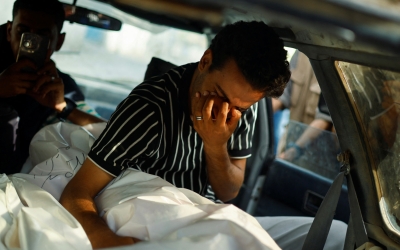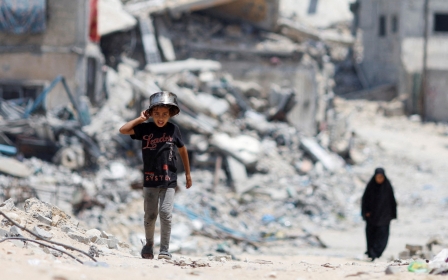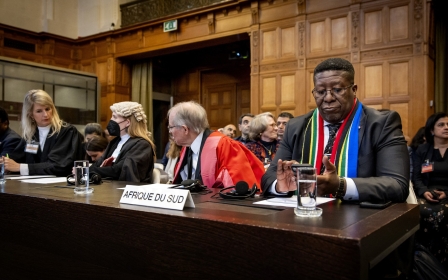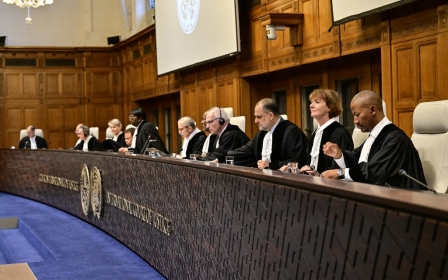Rafah camp bombing: How Israel may have breached international law
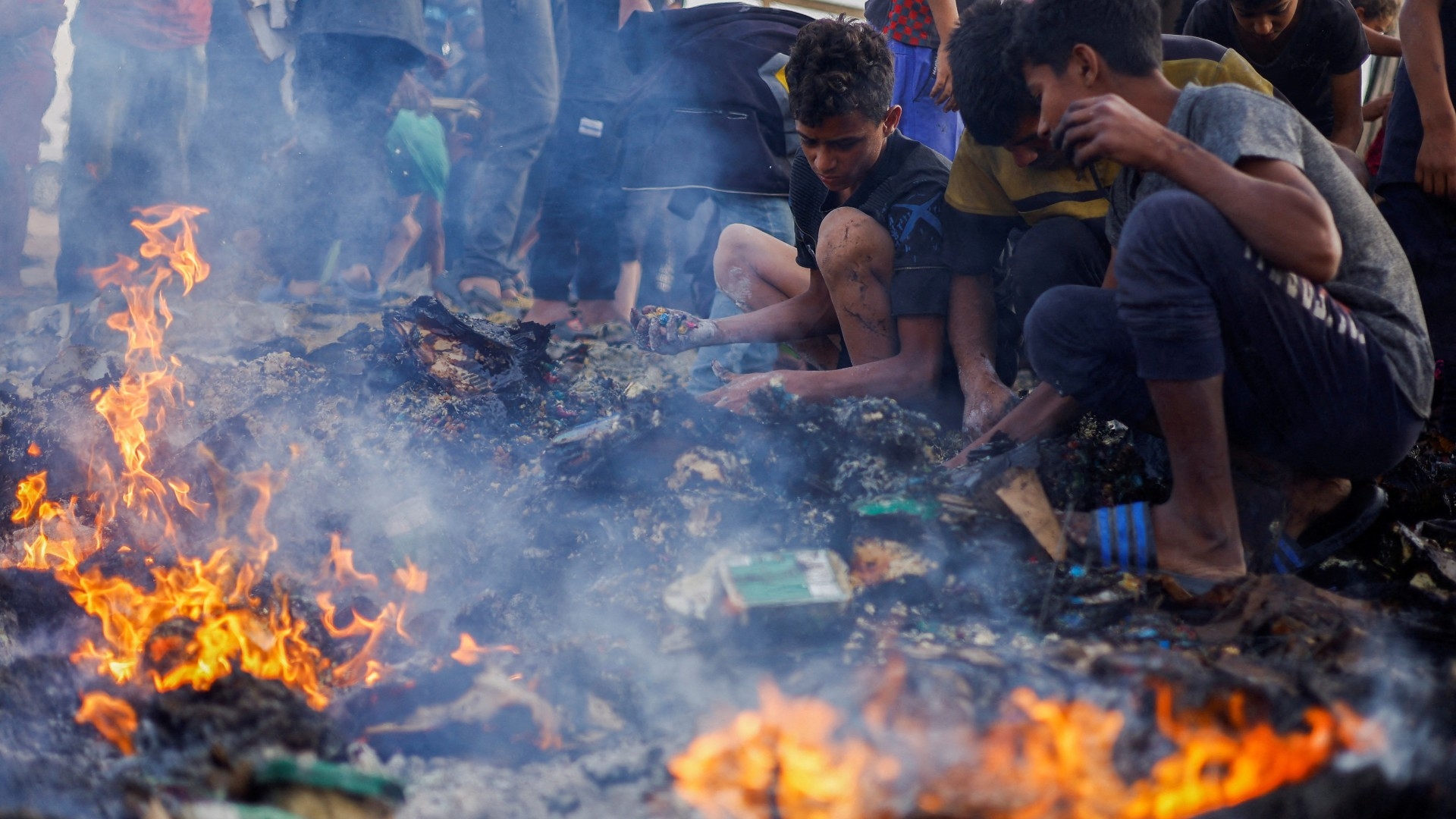
Israel's deadly attack on a Palestinian displacement camp in southern Gaza on Sunday amounts to a war crime and a breach of the binding decisions of the International Court of Justice (ICJ), according to legal experts.
At least 45 people were killed and nearly 250 more wounded when overnight Israeli air strikes targeted a centre for displaced people in the Tel al-Sultan neighbourhood in northwestern Rafah.
According to the Palestinian ministry of health, the fatalities include 23 women, children and elderly people killed after eight missiles were launched at makeshift shelters, setting them ablaze.
Videos posted on social media showed fires raging through makeshift tents while survivors tried in vain to extricate those caught in the flames.
Thousands of people have been taking shelter in the targeted area after many fled other parts of Gaza, including eastern Rafah where Israeli forces began a ground offensive earlier this month.
New MEE newsletter: Jerusalem Dispatch
Sign up to get the latest insights and analysis on Israel-Palestine, alongside Turkey Unpacked and other MEE newsletters
The air strikes came just two days after the International Court of Justice ordered Israel in a legally binding decision to halt its military offensive in Rafah, which may violate its obligations under the Genocide Convention.
The Sunday attack took place in an area that is part of the Israeli-designated "humanitarian zone", which it advised civilians to shelter in.
It was also in the vicinity of warehouses belonging to the UN refugee agency for the Palestinians, Unrwa.
Satellite images show Rafah's Tel al-Sultan after Israeli strike
Drag the button to see the devastation
Distinction and proportionality
Parties to the conflict between Israel and Palestinian groups are obliged under international law to respect the principles of distinction and proportionality, both of which have been recognised as part of customary international law by the International Committee for the Red Cross (ICRC).
According to the principle of distinction, parties to the conflict are only permitted to target combatants and must not target civilians.
Additionally, proportionality prohibits both parties of an armed conflict from launching an attack "which may be expected to cause incidental loss of civilian life, injury to civilians, damage to civilian objects, or a combination thereof, which would be excessive in relation to the concrete and direct military advantage anticipated."
The Israeli military said the attack was based on "precise intelligence" that resulted in the deaths of two members of Hamas' military wing, Yassin Rabia and Khaled Najjar. The Palestinian group has yet to confirm the deaths of its members.
'My opinion is that this attack would contravene the [ICJ] order'
- Alonso Gurmendi, lawyer
Alonso Gurmendi, an international lawyer and academic, said while Israel might argue that the scale of civilian casualties was unforeseeable at the specific time of the attack, it is unlikely that this was the case.
"It is highly doubtful that this would be the case, considering the warning from Israel's closest allies, most humanitarian actors on the ground, and the ICJ - all stated that an attack on Rafah would lead to disastrous consequences and mass deaths," he said.
Gurmendi added that the Tel al-Sultan air strikes contravened the ICJ's latest order for Israel to halt its Rafah military ofensive.
"While a minority of scholars and judges have argued that the court only ordered Israel to halt operations that would subject Palestinians to conditions of life that would lead to their destruction as a group, my opinion is that this attack would contravene the order under either interpretation," he told MEE.
"I think it is important that this strike be thoroughly and independently investigated by the prosecutor of the International Criminal Court (ICC), as part of its investigations into the situation in Palestine," he added.
Itay Epshtain, an international lawyer and humanitarian law expert, said that the assault "tragically demonstrated Israeli rejection of the laws of armed conflict (including distinction, proportionality and precaution in attack).”
Francesca Albanese, an international lawyer and the United Nations' special rapporteur for the occupied Palestinian territories, said the attack was a "blatant defiance of the international law and system".
"The Gaza Genocide will not easily end without external pressure: Israel must face sanctions, justice, suspension of agreements, trade, partnership and investments, as well as participation in international forums," she wrote on X.
As of Monday, the Israeli onslaught on Gaza, which started in October, has killed more than 36,000 Palestinians and wounded at least 81,000, according to the Palestinian health ministry.
Call for more ICC arrest warrants
The Palestinian presidency accused Israel of deliberately targeting the centre for displaced people.
"The perpetration of this heinous massacre by the Israeli occupation forces is a challenge to all international legitimacy resolutions," the presidency said in a statement, accusing Israeli forces of "deliberately targeting" the tents of displaced people.
Israel expanded its invasion of the Gaza Strip by sending tanks and troops into Rafah in early May despite widespread opposition over concerns for civilians sheltering there.
Sunday's air strikes were carried out hours after Israel said it intercepted eight rockets by Hamas from Rafah onto Tel Aviv.
Hamas's armed wing said in a post on Telegram it had targeted Tel Aviv "with a large rocket barrage in response to the Zionist massacres against civilians".
Last week, the ICC's prosecutor Karim Khan applied for arrest warrants for Israel's prime minister and defence minister as well as Hamas leaders for alleged war crimes and crimes against humanity committed since 7 October.
Daniel Machover, an international lawyer, said the ICC should issue more arrest warrants following the Tel al-Sultan attack.
“Additional applications needed urgently to the chamber of the ICC by Prosecutor Karim Khan for arrest warrants for the Israeli chain of command for these well documented international crimes,” he wrote on X.
Middle East Eye delivers independent and unrivalled coverage and analysis of the Middle East, North Africa and beyond. To learn more about republishing this content and the associated fees, please fill out this form. More about MEE can be found here.


